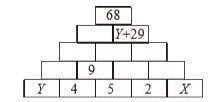Number of cells obtained by meiosis :–
2
4
6
8
The correct Answer is:B
To determine the number of cells obtained by meiosis, we can follow these steps:
1. Understand Meiosis: Meiosis is a type of cell division that reduces the chromosome number by half, resulting in the production of haploid cells from a diploid cell.
2. Meiosis Phases: Meiosis consists of two main stages: Meiosis I and Meiosis II.
- Meiosis I: This stage involves the separation of homologous chromosomes. It results in the formation of two haploid cells from one diploid cell.
- Meiosis II: This stage resembles mitosis, where the two haploid cells from Meiosis I divide again. Each of these cells divides to produce a total of four haploid cells.
3. Calculate Total Cells:
- From Meiosis I: 1 diploid cell → 2 haploid cells
- From Meiosis II: 2 haploid cells → 4 haploid cells
4. Final Count: Therefore, the total number of cells produced by meiosis is 4.
5. Conclusion: The correct answer to the question is that meiosis produces 4 cells.
- Meiosis I: This stage involves the separation of homologous chromosomes. It results in the formation of two haploid cells from one diploid cell.
- Meiosis II: This stage resembles mitosis, where the two haploid cells from Meiosis I divide again. Each of these cells divides to produce a total of four haploid cells.
- From Meiosis I: 1 diploid cell → 2 haploid cells
- From Meiosis II: 2 haploid cells → 4 haploid cells
Topper's Solved these Questions
- BOOK - MOTIONCHAPTER - CELL CYCLE AND CELL DIVISIONEXERCISE - Exercise - 217videos
CELL CYCLE AND CELL DIVISION
- BOOK - MOTIONCHAPTER - CELL CYCLE AND CELL DIVISIONEXERCISE - Exercise - 3 (AIPMT - 2009)2videos
CELL CYCLE AND CELL DIVISION
- BOOK - MOTIONCHAPTER - CELL CYCLE AND CELL DIVISIONEXERCISE - CHECK YOUR CONCEPTS-25videos
CELL CYCLE AND CELL DIVISION
- BOOK - MOTIONCHAPTER - BREATHING AND EXCHANGE OF GASESEXERCISE - Exercise 421videos
BREATHING AND EXCHANGE OF GASES
- BOOK - MOTIONCHAPTER - CELL THE UNIT OF LIFEEXERCISE - Excercise - 4 AIIMS | Assertion & Reason Questions39videos
CELL THE UNIT OF LIFE
Similar Questions
Knowledge Check
- Question 1 - Select One
In the figure, number in any cell is obtained by adding two numbers in the cells directly below it. For example, 9 in the second row is obtained by adding the two numbers 4 and 5 directly below it. The value of X - Y is
 A2B4C3D5
A2B4C3D5 - Question 2 - Select One
Assertion (A): Haploid cells are formed by meiosis cell division.
Reason (R ): Gametes are haploid cells.ABoth A and R are true and R is the correct explanation for A.BBoth A and R are true, but R is not the correct explanation for A.CA is true and R is false.DA is false and R is true. - Question 3 - Select One
Four daughter cells obtained from a single meiosis differ from one another because of
ACrossing overBIndependent assortmentCChange in chromosome numberDBoth A and B
Type of cells in which meiosis takes place.
View SolutionArrange the following in descending order
(a) Number of bivalents formed during meiosis of a spore mother of Ophioglossum
(b) Number of chromatids seen on equator at metaphase I in pollen mother cell of Haplopappus gracilis during meiosis
(c ) Number of chromosomes found at one pole after anaphase II during meiosis in butterfly
(d) Total number of chromosomes found in all daughter cells formed during meiosis from one megaspore mother cell in PotatoView SolutionThe type of cells under going meiosis in the flowers are
View SolutionHow many chromosomes will be in cells of human, produces by meiosis ?
View SolutionFour daughter cells formed after meiosis are
View Solution

